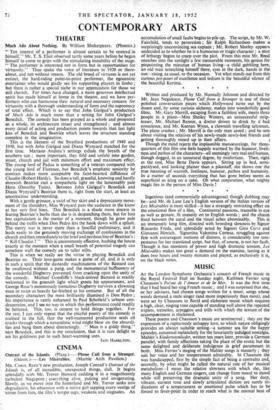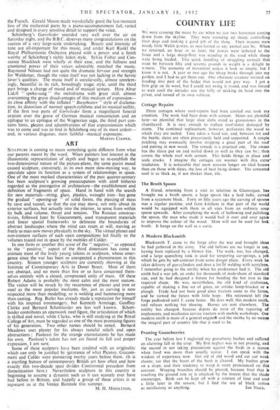MUSIC Ar the London Symphony Orchestra's concert of French music
in- the Royal Festival Hall on Sunday night, Kathleen Ferrier sang Chausson's Poi:me de l'Arnour et de la Mer. It was the first time that I had heard her sing French music ; and I was surprised that she, or her advisers, had chosen songs written for a tenor, songs whose words demand a male singer (and more imperiously than most), and were set by Chausson to florid and elaborate music which requires a high, clear, ringing tone capable of standing well above the repeated triplets, tremolos, arpeggios and trills With which the texture of the accompaniment is thickened.
These poems and Chausson's music are sentimental ; they are the expression of a rapturously unhappy-love, to which nature obligingly provides an always suitable setting—a summer sea for the happy episodes, autumnal melancholy for the luxuriantly indulged nostalgia. Mahter's Kindertotenlieder, written ten years later, provide a German parallel, with family affections taking the place of the erotic but the same delighted and deliberate indulgence in grief paramount in both. Miss Ferrier's singing of the Mahler songs is masterly ; they suit her voice and her temperament admirably. In Chausson she was handicapped, first by the simple fact of being a contralto and, secondly, by what might be called the natural rate of her musical metabolism—i mean the relative slowness with which she, like many English and German singers, can change frommood to mood while still preserving the dramatic unity of a song. Her deep, vibrant, earnest tone and slowly articulated diction are surely in- dications of a temperament or emotional pulse which has to be forced to fever-point in order to reach what is the normal beat of the French. Gerald Moore made wonderfully good the last-moment loss of the orchestral parts by a piano-accompaniment full, varied and designed in every sensitive detail to support the voice.
Schonberg's Gurrelieder sounded very well over the air on Saturday night, and the B.B.C. deserves many congratulations on the success of a very large-scale undertaking. Beauty and intensity of tone are all-important for this music, and under Karl Rankl the Royal Philharmonic Orchestra played with a power and a finish worthy of Schonberg's richly laden style. ' Sylvia Fisher and Con- stance Shacklock were wholly at their ease, and the fullness and emotional power of their voices admirably matched the music. Raymond Nilsson had not quite the dramatic fervour and strength for Waldemar, though the voice-itself was not lacking in the heroic lover's qualities. The music itself is unrelievedly, almost unrelent- ingly, beautiful in its rich, broodingly tragic style, until the third part brings a change of mood and of musical texture. Here Alvar Lidell " spoke-sang " the melodrama with great skill, almost overcoming the grave disadvantages of this medium of expression— its close affinity with the inflated " Burgtheater " style of declama- tion, its distortion of normal speech-ryhtluns and its musical nullity. If the first two parts of Gurrelieder form a magnificent funeral oration over- the „grave of German musical romanticism and an epilogue to an epilogue of the Wagnerian saga, the third part con- tain& hints, gleams and adumbrations of that expressionism which was to come and was to find in Sch8nberg one of its most ardent— and, in various disguises, most faithful—musical exponents.
MARTIN COOPER.



































 Previous page
Previous page